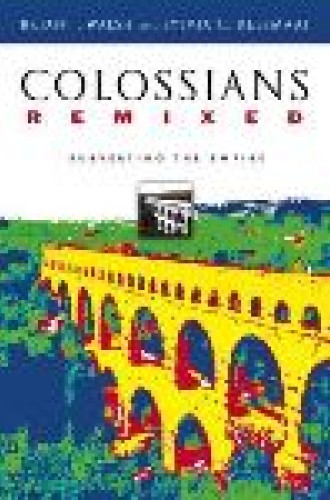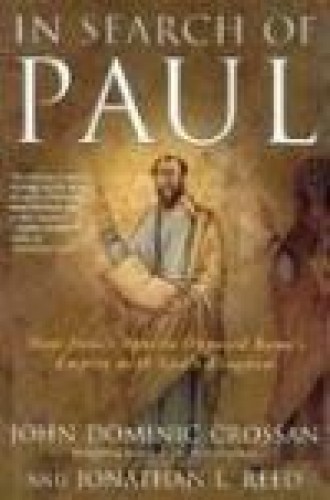The gospel alternative
For many people the phrase “Paul and politics” refers to nothing more than Romans 13 and the common conclusion that Paul was basically a conservative supporter of government as a divinely appointed institution. But in the last decade or so the study of Paul and his politics has undergone a sea change, represented in the work of diverse scholars, including Neil Elliott, Richard Horsley and N. T. Wright.
Two assumptions have become axiomatic in Pauline studies: that the pervasive Roman imperial cult is an essential aspect of Paul’s context and that Paul’s gospel is inherently both theopolitical and counterimperial. A third theme, increasingly explicit among interpreters, is that Paul’s gospel confronts all imperial systems, and especially the new American empire of global consumerism and military might. In Search of Paul and Colossians Remixed share all three of these assumptions.
John Dominic Crossan, famous for his radical and controversial interpretations of Jesus, and archaeologist Jonathan Reed present a radical but not markedly controversial reading of Paul. They contend that in stark opposition to the Roman gospel of peace established through piety, war and global victory, Paul preaches an alternative gospel of peace established through covenant, nonviolence and global justice, in which Jesus, not the emperor, reveals the true character and will of God. Like Crossan’s Jesus, the authentic Paul of the seven genuine letters preaches “eschatology and equality now” in contrast to Roman hierarchy and domination. (The authors argue that the remaining letters—2 Thessalonians, Colossians, Ephesians and the pastoral epistles—are in many ways “anti-Pauline.”) Justification, they say, is the global establishment of God’s nonviolent distributive justice.
Crossan and Reed interpret the various letters of Paul in light of the imperial cult that held the empire together. Imperial devotion is expressed in many ways in Rome’s “visual culture”—coinage, statues, buildings and inscriptions—as well as in literature. As even the authors admit, the lengthy discussions of this evidence may overwhelm the reader, though they are punctuated with scores of photographs and personal notes from the authors’ travels. These discussions do provide significant insights for the (often all too brief) interpretations of Paul’s letters. For example, Crossan and Reed rightly suggest that the hymn of Philippians 2:6-11 reveals a “kenotic divinity” that is antithetical to images of divine imperial power, and that the Corinthian letter reveals the necessity of a corresponding “kenotic community.” On the other hand, their interpretations of texts from the disputed letters and Acts are sometimes less than persuasive.
Most of the conclusions about Paul and empire that Crossan and Reed offer have been presented elsewhere, and sometimes more concisely (for example, in Horsley’s Paul and Empire), though not with helpful graphics. But two things set this book apart: negatively, a few tangential and idiosyncratic subtheses (that Paul deliberately engaged in “convert poaching” at synagogues by targeting primarily God-fearers, for instance), and positively, a willingness to specifically (though briefly) compare America to Rome and thus to contrast it with God’s kingdom. This latter interpretive move, however, is not fully satisfying. Though the authors laud Paul for sharing Jesus’ commitment to God’s kingdom, they appear to see Paul and Jesus not as unique bearers of God’s justice but as manifestations of a universal principle that can also be seen elsewhere. The book does not conclude with a political ecclesiology but with politics more generally.
Nevertheless, throughout the book the authors write provocatively about the abnormal “normalcy” of civilization, built as it so often is on the twin pillars of hierarchy and power, and about the gospel’s undermining of those pillars. They also write insightfully about the standard imperial connections between piety, war and global “peace.” The analogies between Rome and America are at times startling. For this reason, if no other, the book should be widely read.
What Crossan and Reed explicitly treat only briefly, Brian Walsh and Sylvia Keesmaat take on directly throughout Colossians Remixed, and they do so via a letter that Crossan and Reed consider anti-Pauline. In an unusual alternative to the commentary genre, they argue creatively and persuasively that this letter from Paul is an “explosive and subversive tract” that undermined imperial realities in the first century. Colossians, they say, should once again subvert empire as it is “remixed,” or reread, in the postmodern era by those who live in the heart of the Pax Americana, the reign of global consumerism secured by socioeconomic and military structures. The authors, a husband and wife from the Christian Reformed tradition who minister and teach in Toronto, include themselves in this context, and like Crossan and Reed they lament that most people find empire to be normal.
Walsh and Keesmaat demonstrate that the hymn in Colossians 1:15-20 displays the worldview and master story of a community called to participate in God’s reconciliation of the world through Christ. Those who are in Christ embody values that are antithetical to many of the basic values of empire, whether Roman or American. They are to reject the postmodern metanarrative of consumerism and to “secede” from its culture of greed and violence, not by abandoning their culture but by living as a people who constitute an alternative to the empire’s practices and who promote gospel practices within the empire. They must spread God’s salvation and peace through care for others and for the earth rather than consumerism, through acts of compassion and reconciliation rather than military action. They should read and perform Colossians (and the rest of the Bible) to discern ways in which the Spirit is inspiring “faithful improvisation” on the text. Walsh and Keesmaat offer numerous concrete suggestions about such contemporary improvisation.
In Search of Paul can at times be a tedious read of archaeological “texts” and may not be fully theologically satisfying, but Colossians Remixed is a lively, engaging blend of exegesis, cultural analysis and explicit Christian theological interpretation that is an intriguing blend of Reformed and Anabaptist thought. The authors use a variety of literary forms to achieve this: creative historical reconstructions; imaginary conversations with their postmodern audience; and insightful “targums” (interpretive paraphrases focused on a contemporary audience) on the text of Colossians. The book is a unique, compelling and challenging read, both intellectually and spiritually. Readers should be prepared to wade through one or two dense but rewarding discussions of postmodern theory and to rethink a wide range of issues.
These two books witness to a growing consensus among theologians and others that Christian faith and American empire are bound to clash and that the Christian church must become an alternative, counterimperial community with a prophetic voice and a different way of life. The current American agenda is seen as dangerous (if not demonic), not divine.
This conclusion is not yet shared by the average pastor or churchgoer; in fact, American Christianity still often assumes the rightness of merging empire with Christian piety. Even progressives may conclude that these books go too far, either in their indictment of American empire or in their thesis that Paul was—and that we should be—counterimperial. But if these four authors are on target, as I think they are, we can only hope that many people will read their books and ask, How shall we now live?







